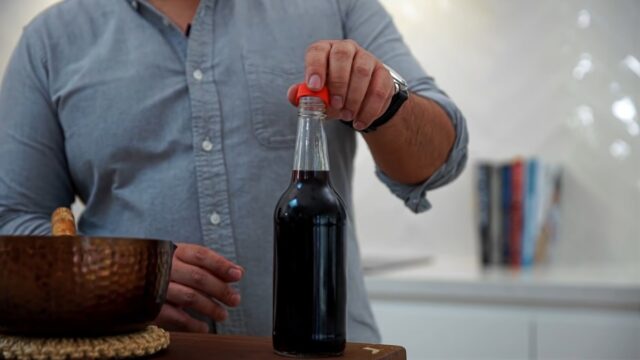
Teriyaki sauce – my favorite blend of sweet and savory flavors! I’m a huge fan of it and I use it almost every day. But I have never been sure how to store it properly. Does teriyaki sauce ever go bad?
If yes, what are the signs of its spoilage? As I needed the answers as quickly as possible, I decided to do a little research myself and help all of you who have been asking the same questions.
Let’s answer all these questions and more, providing you with valuable insights into the longevity and safe handling of teriyaki sauce.
Shelf Life
Teriyaki sauce, like most condiments, has a finite shelf life. A typical commercially-made teriyaki sauce, if unopened, can last in your pantry for up to two years beyond the ‘best by’ date printed on the bottle. Once opened, it’s safe to use for about one to two months when stored in the refrigerator.
However, the longevity of the sauce can be influenced by several factors such as the specific ingredients used, preservatives added, and storage conditions. Always check the expiration date on the packaging for an accurate timeline.
Homemade Teriyaki Sauce
Due to the absence of preservatives, it has a significantly shorter shelf life, typically lasting about a week in the refrigerator. It’s important to store the homemade sauce in a clean, airtight container and label it with the date it was made to keep track of its freshness.
As with store-bought sauce, be sure to use quality ingredients and trusted recipes.
Storage Recommendations
Proper storage is essential to maintain the quality and prolong the shelf life. Ideally, it should be kept in a cool, dry place away from direct sunlight before opening. Once opened, always ensure the lid is tightly sealed to prevent exposure to air and contaminants, and store it in the refrigerator.
It’s crucial to use a clean utensil when serving the sauce to avoid introducing bacteria that could lead to spoilage.
Unopened Bottle
An unopened bottle, when stored correctly, can last quite a long time — often up to a couple of years beyond the ‘best by’ date. However, ensure the packaging is undamaged and has not been tampered with. Any signs of damage could indicate that the sauce has been exposed to air or contaminants and may not be safe to consume.
Opened Bottle
Once opened, the sauce has a shorter shelf life, generally lasting about one to two months when properly refrigerated. Keeping it in an airtight container can further help maintain its freshness. If it has been left out at room temperature for an extended period, it’s best to err on the side of caution and discard it.
Signs of Spoilage
Knowing how to identify signs of spoilage can save you from an unpleasant experience or potential foodborne illness.
Look out for changes in color or texture, such as thickening or separation of the sauce. Mold growth is another definitive sign of spoilage. If you notice an off-putting smell or an unusual taste, trust your senses and discard it.
Mold Growth
Despite the preservatives typically present in store-bought teriyaki sauce, mold can still develop, especially if it is improperly stored or contaminated by utensils. This poses a serious food safety risk.
If you spot mold, don’t attempt to scoop it out and use the rest. Instead, discard the entire bottle to ensure you don’t consume any harmful substances.
Refrigerated Teriyaki Sauce
Refrigerating it after opening can significantly extend its shelf life, helping it last for up to two months. The cold temperature slows down the growth of bacteria and mold, keeping the sauce fresh for longer.
Make sure your refrigerator maintains a consistent temperature and avoid leaving the sauce out for too long, as temperature fluctuations can negatively impact its quality.
Freezing
If you’re not planning to use your teriyaki sauce within a couple of months, can you freeze it? The answer is yes! Freezing won’t significantly alter its flavor or texture, making it a viable long-term storage option.
Make sure to leave some room in the container for the sauce to expand as it freezes. Thaw it in the refrigerator when you’re ready to use it, and stir well before serving.
Quality over Time
Over time, even properly stored bottles may experience changes in quality. The flavor might become less pronounced, and the texture might thicken slightly. While these changes don’t necessarily mean it has spoiled, they can affect your culinary experience.
So, if you notice any alterations that are beyond your personal preference, it may be best to replace the bottle.
Safe Consumption Practices
Safety should always come first when handling and consuming any food product, including teriyaki sauce. Always check for signs of spoilage before using it and avoid consuming it past its expiration date. If you’re using it as a marinade, ensure it’s adequately heated during cooking to kill any potential bacteria.
FAQs:
Can I use teriyaki sauce past its expiration date if it looks and smells fine?
It is generally not recommended to use it past its expiration date, even if it appears and smells fine.
Can I reuse the one that has been cooked with raw meat?
It is not safe to reuse teriyaki sauce that has come into contact with raw meat due to potential contamination.
Can I store it in a clear glass bottle?
It is best to store it in a dark-colored bottle or in its original packaging to protect it from light.
Can I store it in a metal container?
It is best to avoid storing it in metal containers as it may react with the sauce and affect its quality.
Is it necessary to refrigerate the store-bought sauce before opening?
Unless the packaging specifically instructs refrigeration before opening, it is not necessary to refrigerate the store-bought sauce before opening.
Conclusion
In conclusion, while teriyaki sauce is a relatively shelf-stable product, it does have its limits. Proper storage and regular checks for signs of spoilage are essential to ensure the sauce remains edible and delicious to use, whether you’re cooking with a store-bought or your homemade concoction.
When in doubt, err on the side of caution and discard it rather than risking foodborne illness. After all, a great culinary experience should never come at the expense of your health.













